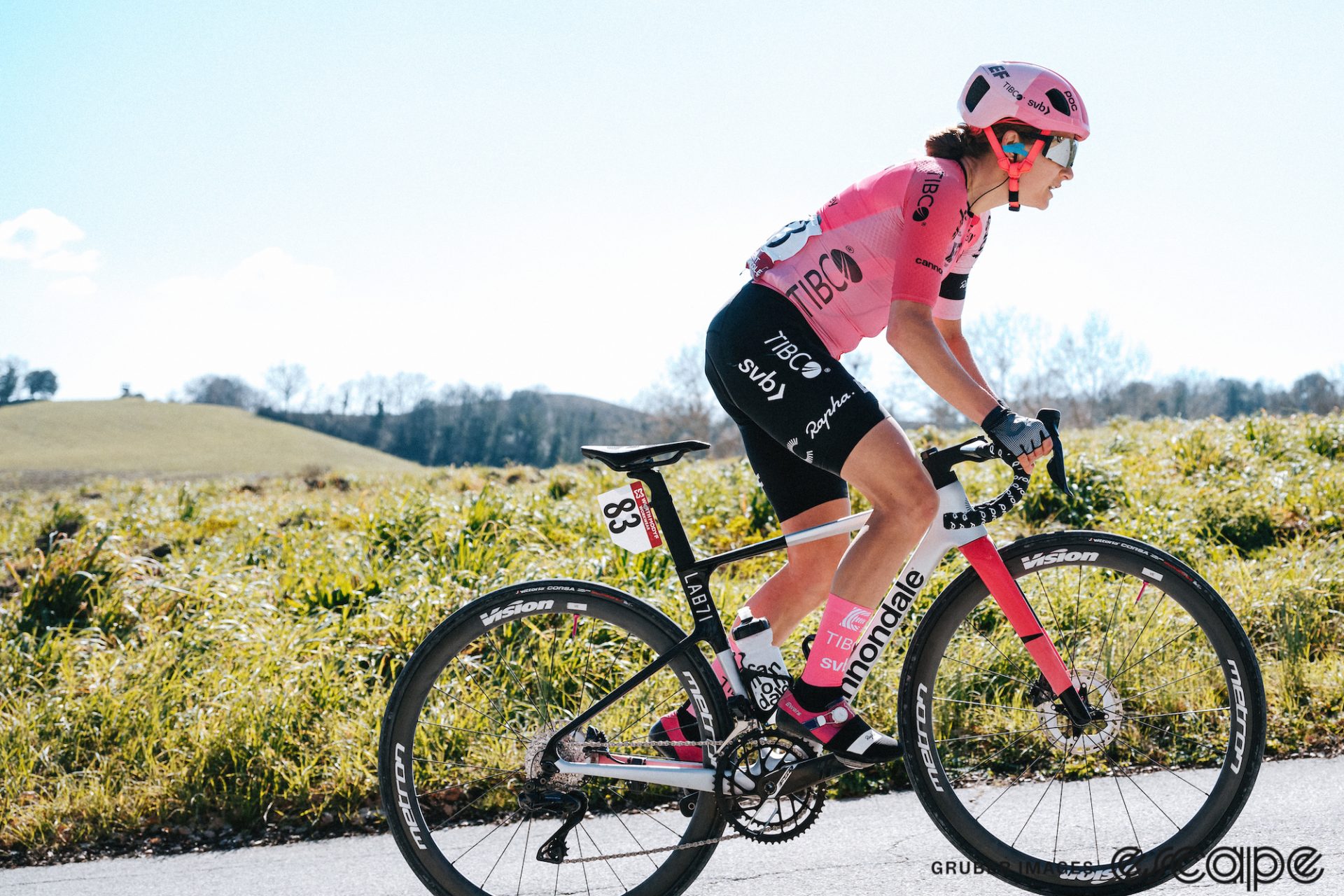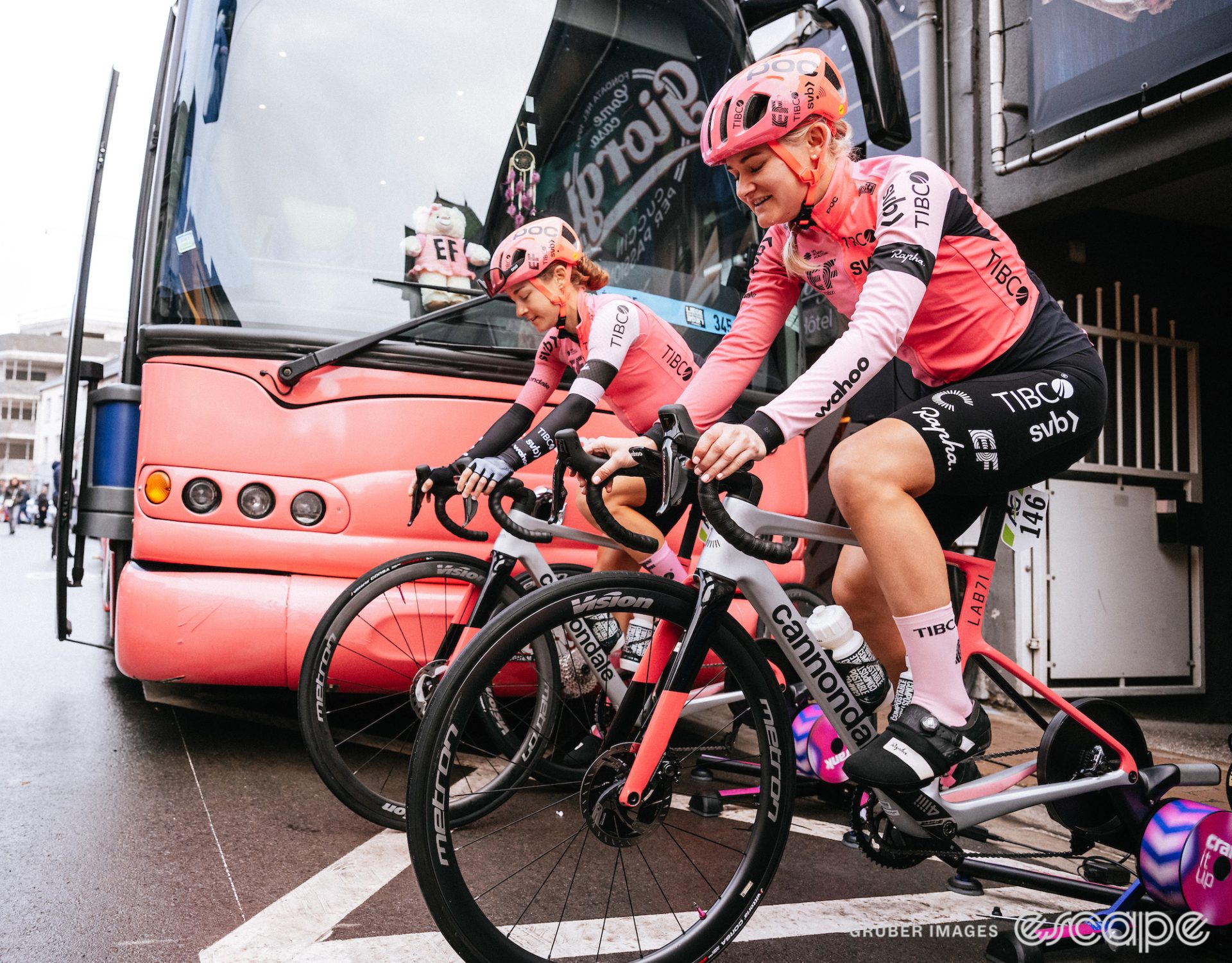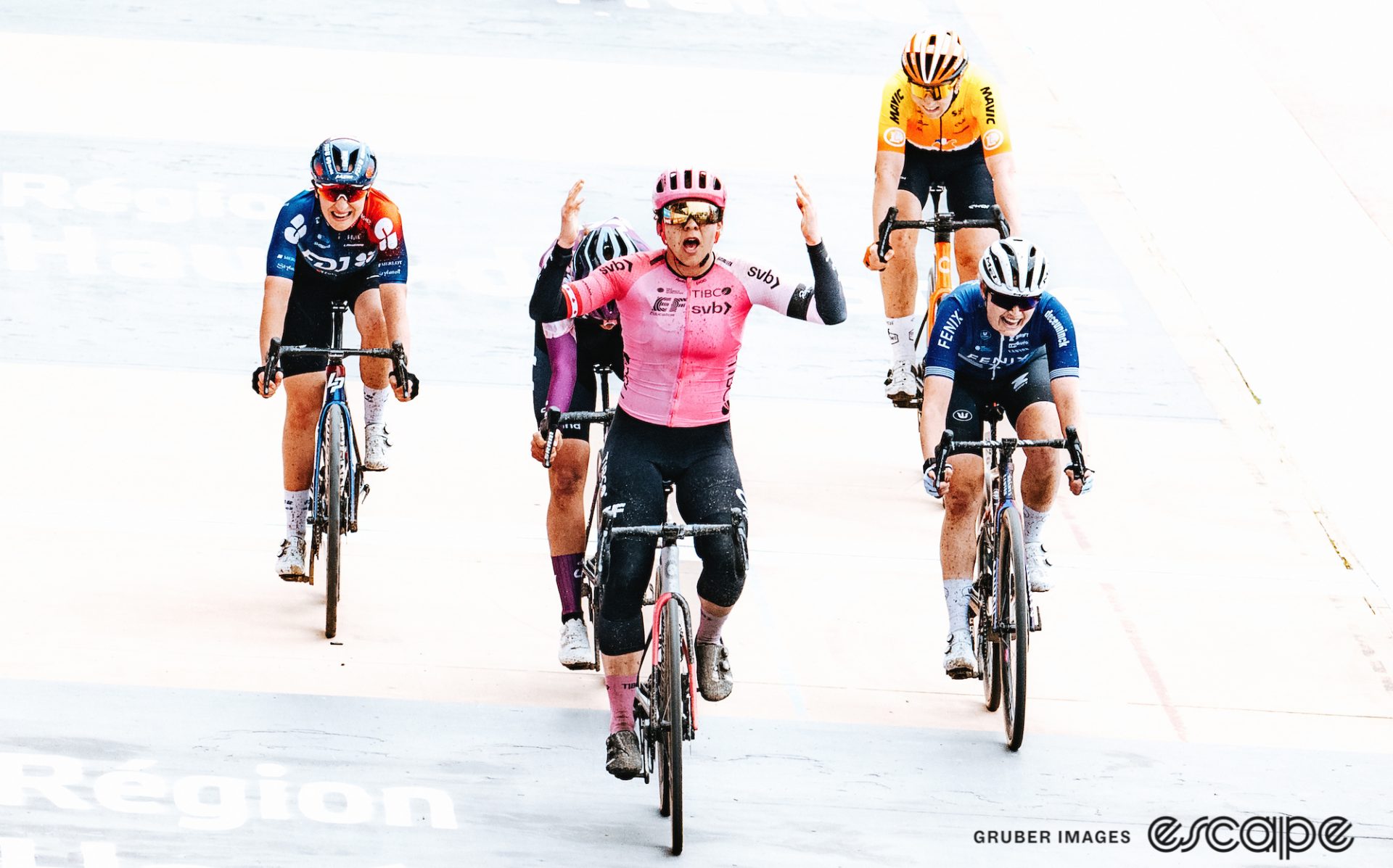EF Education announced last Thursday that for the 2024 season it will own and manage a professional women’s cycling team. If that sounds confusing, you’re not alone; after all, there’s already a Women’s WorldTour team racing in the distinctive pink kit. A short press release answered some questions but raised more, and now we have (a few) more details.
The distinction between EF’s teams is that the men’s team is owned and managed by the company, while on the women’s side the company lends its name as title sponsor to a team owned and managed by Linda Jackson. That arrangement is changing, but exactly what the new team will look like – both in racers and management – is still very much in flux, because EF has so far been unable to reach agreement with Jackson on purchasing the team. That looks increasingly unlikely.
In an interview with Escape Collective, EF general manager Jonathan Vaughters said that the 2024 women’s team, to be called EF Education-Cannondale, will be a new operation. “We’ll be applying for the highest-level license that we can garner in the first year,” he said, without specifying the WorldTour. He said the team is actively recruiting riders.
Vaughters wasn’t ready to entirely foreclose the possibility of a deal between the sides, and credited Jackson’s experience and expertise in women’s racing, but declined to say if she would be part of EF’s new effort. “Linda has made a hugely positive contribution to the sport and we were able to do some great things with her and her organization,” he said. “We certainly would like her to be involved, but it just won’t be at the ownership level.” Reached via e-mail, Jackson declined to comment for the time being.
Jackson, a six-time Canadian national champion and bronze medalist at the 1996 Road Worlds, started the team that is now EF Education-TIBCO-SVB back in 2007 as a small development outfit. Respected as a keen judge of talent, over the past 15+ seasons Jackson helped start or further the pro careers of riders like Megan Guarnier (who would go on to win Strade Bianche and the Giro Femminile), Kristen Faulkner, and Veronica Ewers, among others.

The team has been sponsored by TIBCO software since its start, and in 2022, the addition of EF as a title sponsor heralded another step up, with a Women’s WorldTour license. Under Jackson’s guidance, the team achieved its biggest-ever win this spring, with Alison Jackson’s stunning victory at Paris-Roubaix.
But that win came just a month after the equally stunning collapse of Silicon Valley Bank, a team co-sponsor since 2015. And a little over a week ago, Jackson confirmed that TIBCO, which merged a year ago with another software company, was out as well after 2023. According to Vaughters, EF’s decision to start a team “was not in the works before those things happened; those definitely precipitated this.”
According to Vaughters, the situation is similar to what happened to the men’s team in 2017 when it faced a funding gap. “We had some sponsors, but not enough to continue as a team,” he said of the near-death of what was then Cannondale-Drapac. EF’s solution was simple, but drastic: it wanted to own the team rather than “be held at arm’s length” as just a title sponsor.
With the women’s team facing the imminent loss of two longtime co-title sponsors, Vaughters said, “It was the same thing: [EF said] we’ll fund the entire thing, and actually fund it to a point that it will be better supported, but we want to own it.”

That sounds like a straightforward solution but, said Vaughters, the two sides haven’t been able to agree on buyout terms. Vaughters, again pointing to his experiences with the men’s team, remarked that “since teams aren’t franchises, they basically don’t have any equity value.” When he and Slipstream Sports owner Doug Ellis decided to sell the men’s team to EF, “the value of the organization was basically liquidated assets” like team bikes and vehicles. The – so far unsuccessful – challenge according to Vaughters has been to reach a similar agreement with Jackson. Technically, that’s still possible, but EF’s announcement makes it clear they’re moving forward regardless.
Vaughters said the team’s goal is to build, over the next 3-4 years, into one of the best in the sport. The plan is to add some dedicated women’s team staff in some areas, like women’s physiology experts in sports science, but overall integrate the men’s and women’s teams as a single unit, down to co-ed offseason training camps.
But much is unsettled for now, especially – assuming EF and Jackson can’t come to some kind of 11th-hour agreement on a buyout – whether the new team will have a WorldTour or Continental license in its first year, and whether Jackson will try to keep an independent team afloat under other, to-be-secured sponsorship.
What’s also unknown is what the new EF team might look like. Of the current roster of 16 riders, just one – Ewers – is known to be under contract past 2023, and to Jackson’s organization, not EF; the rest are on the market. Vaughters declined to get into specifics of the roster, but said “we’ll start making announcements on that probably within the next two weeks.” Vaughters concedes he’s “new to the game” on women’s cycling [not entirely; after merging with Cervelo Test Team, Slipstream ran a women’s team for one year before shuttering it – Ed.], but said that the opportunities in women’s cycling are more open than the men.
“The women’s side is growing at a much quicker rate than the men and is becoming more competitive at a much quicker rate,” Vaughters said. Where the men’s peloton is dominated by super teams backed by petroleum wealth and state investment funds, “there’s a broader opportunity to build faster to being one of the best teams in the world” on the women’s side.
EF has decided it very much wants to be part of the growth of women’s cycling and take advantage of those opportunities. The big question is who will be part of that project; the coming weeks may provide some answers.
What did you think of this story?

